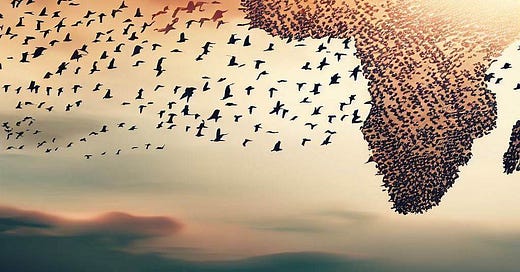The 1990s marked a tumultuous era for families in developing countries, particularly in Africa, where conflicts and climate disasters wreaked havoc. In the face of such challenges, individuals were left with two choices: to stay and rebuild (Option A) or to seek better opportunities elsewhere (Option B). The consequences of these decisions continue to reverberate today, emphasizing the importance of Ubuntu—the idea that authentic human beings are interconnected within a larger relational, communal, societal, environmental, and spiritual world. As a child of migrant parents who chose to escape, I have witnessed both the benefits and the hardships of migration. Now, as we reflect on the Western dream, we realize it may not be the utopia we once believed it to be. It is time for the diaspora to consider a Great Return, leveraging their knowledge and experiences to empower the native population, while the natives embrace this as a beacon of hope. However, I urge caution against falling into the trap of false hope and false advertising, and to consider the realities on both sides before making a decision.
The Challenges of Migration
Migration offers the promise of a better life, but it also comes with its own set of challenges. As the offspring of migrants, we carry the responsibility of making the most of the opportunities afforded to us in the West. While many have achieved remarkable success, others have fallen victim to mental health issues, addiction, and survivor's guilt. Furthermore, a superiority complex can sometimes plague our subconscious, hindering our ability to connect authentically with others. It is clear that after several decades, the West does not always live up to the utopian image we were conditioned to believe. Many of us are dissatisfied with our current situations and worry about the future generation.
The Illusion of Success and Financial Struggles
Even for those who have followed the prescribed path, obtaining degrees and valuable skills, the dream can still prove elusive. The high cost of living and the burden of debt trap many of us, making it difficult to acquire tangible assets. We find ourselves working excessive hours to support not only our immediate families but also our extended families back home. Beneath our forced smiles, we silently question if this is all there is to life. Meanwhile, we look back at our brothers and sisters in Africa, admiring their inner peace while sharing only the highlight reels of our lives on social media.
The Great Return: A Call to Arms and a Beacon of Hope
In this context, the concept of the Great Return emerges as a potential solution. To the diaspora, it is an opportunity to leverage their knowledge, capital, and experiences to empower the native population rather than perpetuating the brain drain. To the natives, it offers a beacon of hope—an opportunity to collaborate with individuals who can help turn their wildest dreams into reality. However, it is important to acknowledge the hypocrisy of advising others to stay and build in Africa while recognizing the need for personal experiences and exploration. The key is to make an informed decision and return if the grass is not greener on the other side.
Conclusion
False hope and false advertising have influenced our perceptions of the West and the opportunities it holds. While migration can offer new possibilities, it also comes with its own set of challenges and disillusionment. The Great Return serves as a potential alternative, inviting the diaspora to contribute their skills and experiences to uplift the native population, while offering hope to those in Africa who dream of building a better future. It is crucial, however, to critically examine both sides and make informed choices that align with our values and aspirations. By doing so, we can strive for genuine progress and collective empowerment.




